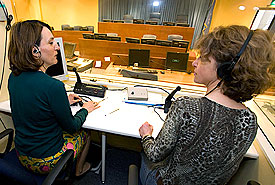 The two official languages of the Tribunal are English and French and all staff and judges must speak at least one of these languages. In addition to that, and in accordance with international human rights standards, all accused have a right to use their native language in court. The accused before the Tribunal speak Bosnian/Croatian/Serbian (BCS), Albanian or Macedonian. As a consequence, all court proceedings are held in at least three, and sometimes four, languages while the vast majority of its written documents are translated into anywhere from two to five languages. Interpreters, who work with the spoken word, and translators, who work with the written text, are therefore critical to practically every aspect of the Tribunal’s work.
The two official languages of the Tribunal are English and French and all staff and judges must speak at least one of these languages. In addition to that, and in accordance with international human rights standards, all accused have a right to use their native language in court. The accused before the Tribunal speak Bosnian/Croatian/Serbian (BCS), Albanian or Macedonian. As a consequence, all court proceedings are held in at least three, and sometimes four, languages while the vast majority of its written documents are translated into anywhere from two to five languages. Interpreters, who work with the spoken word, and translators, who work with the written text, are therefore critical to practically every aspect of the Tribunal’s work.
Each courtroom has several soundproof interpretation booths to provide simultaneous interpretation services for all the court participants and for the listening public. Interpreters work in teams of two and interpret for 30 minutes at one time, while their colleague provides back-up. After 30 minutes, they switch. Interpreters must speak in the first person, making the words sound both natural and fluent, and convey the wording used by those they interpret with the greatest accuracy and neutrality. Any mistakes made in court are quickly acknowledged and rectified. Interpreters are also required to respect the confidentiality of the proceedings and strive for professional detachment at all times.
All the Tribunal’s basic legal documents such as the Rules of Procedure and Evidence, Statute, indictments and judgements, are translated into English, French, BCS, and where appropriate, into Albanian and Macedonian. In addition, documents tendered as evidence at trial, as well as motions to the court, are translated into one of the official languages. Translating thousands of pages of written material is an ongoing and time consuming task.
At the Tribunal, the Conference and Language Service Section (CLSS) is responsible for all translation and interpretation. It is staffed with highly qualified and certified court interpreters and translators specialising in legal translation. In addition to providing interpretation and translation services, CLSS also employs court reporters who take transcripts of the Tribunal’s hearings.
Interpretation
There are two kinds of interpretation: simultaneous interpretation and consecutive interpretation. In simultaneous interpretation, the interpreter speaks at the same rate and only a few second behind the speaker. This type of interpretation requires special equipment (microphones and headsets) and is the interpretation style used in the Tribunal’s courtrooms. In consecutive interpretation, the interpreter starts speaking after the speaker stops. This kind of interpretation is used by the Tribunal both in-house, for example for meetings or interviews, and for field work where no interpretation equipment is available.
Interpreters and Translators Duties
Interpreters and translators are bound by the Tribunal’s Code of Ethics. They have a duty to maintain information they obtain in the course of their work confidential even after they leave the Tribunal. When interpreting or translating communications between suspects or accused and their lawyers, they are bound by the rule of legal professional privilege and must not disclose any information they obtain without their express consent. They are required to act independently, impartially and strive for professional detachment at all times. They must translate accurately, and when working in the courtrooms alert the judges to any doubt arising from the speaker’s choice of words.
Consistent Terminology
Often, there are a number of ways to translate a term or word from one language to another. The Tribunal’s Conference and Language Services Section has a unit dedicated to maintaining consistency in terminology and provides glossaries to its interpreters and translators.

